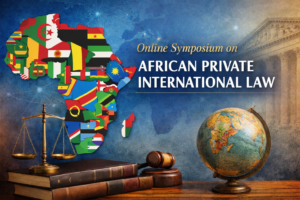One Afghanistan-based company sues another in commercial court in Afghanistan. The plaintiff wins at trial. The Afghanistan Supreme Court reverses. It orders the parties to resolve their dispute in the United States. The plaintiff files suit in the United States. Chaos ensues.
This may sound like an unlikely scenario. It is, however, a concise description of the facts presented in Nawai Wardak Transportation Co. v. RMA Grp. Afghanistan Ltd, No. 350393 (Mich. Ct. App. 2021). This case is noteworthy for a number of reasons. It offers insights into best drafting practices for choice-of-court clauses. It illustrates how U.S. courts decide whether these clauses should be enforced. And it suggests that the Afghanistan Supreme Court takes the principle of party autonomy pretty seriously.
In July 2012, the United States Agency for International Development (“USAID”) contracted with Aircraft Charter Solutions (“ACS”) to perform aircraft flight operations out of Kabul International Airport in Afghanistan. ACS entered into a contract with RMA Afghanistan (“RMA”), an Afghanistan-based company, to supply fuel to locations throughout Afghanistan. RMA, in turn, entered into a contract with Nawai Wardak Transportation Company (“NWTC”), another Afghanistan-based company, to supply fuel in support of the contract between USAID and ACS. The contract between RMA and NWTC contained the following provision:
The parties irrevocably agree that the courts of the United States of America shall have exclusive jurisdiction to settle any dispute or claim that arises out of or in connection with this Agreement or its subject matter or formation (including non-contractual disputes or claims).
Roughly a year after the RMA-NWTC contract was signed, a dispute arose. NWTC demanded payment. RMA refused. NWTC brought a suit against RMA in commercial court in Afghanistan and won a judgment. The Supreme Court of Afghanistan reversed the judgment of the lower court. It concluded that the case should have been dismissed because the parties had previously agreed in their choice-of-court clause to litigate all disputes in the United States.
Undeterred, NWTC filed suit against RMA in state court in Michigan. RMA immediately moved to dismiss the Michigan lawsuit on the grounds that the state court lacked personal jurisdiction over it. It argued that it had only consented to suit in federal court via the choice-of-court clause. It pointed out that that clause referred to the courts “of” the United States of America. It then argued that this language necessarily excluded state courts because these courts were only “of” the State of Michigan. They were not courts of the United States as a whole.
NWTC responded to this argument by pointing out that the case could not be heard in federal court because those courts lacked subject-matter jurisdiction on the facts presented. If the clause were interpreted the manner suggested by RMA, the plaintiff contended, then the choice-of-court clause would be rendered a nullity because no court in the United States could hear the claim and it would be deprived of a remedy altogether.
The state trial court in Michigan ruled in favor of RMA and dismissed the case. This decision was then appealed to the Court of Appeals of Michigan. That court acknowledged that “the dictionary definition of ‘of’ supports that, while Michigan courts may be in the United States, they are not of the United States.” The court then went on to conclude, however, that dictionary definitions are not conclusive:
We are not constrained to follow dictionary definitions when interpreting a contract, and the effect of interpreting the forum-selection clause to refer exclusively to federal courts is to deprive both parties of a forum in which to resolve their contract disputes. In other words, for either party to have had a legal remedy for the other party’s failure to perform under the subcontract, the parties must have intended “courts of the United States of America” as a geographical designation encompassing both federal and state courts. Any other reading of the forum-selection clause would render it nugatory, which is to be avoided when interpreting contracts.
The court of appeals then considered the defendant’s argument that if the clause was interpreted to refer to any state court in the United States, it would become so “overbroad and so lacking in specificity” that “enforcing it would be unreasonable and unjust.” The court held that this argument had not been fully developed in the proceedings below. Accordingly, it remanded the case for further consideration by the lower court.
This case presents a number of interesting issues relating to choice-of-court clauses. The first has to do with contract drafting. As a matter of best practice, it is better to name a specific U.S. state in which a suit must be brought rather than the United States as a whole. If the clause selects the nation as a whole, however, it is better to select the courts “in” in the United States rather than courts “of” the United States to make clear that the suit may be brought in either state or federal court.
The second issue relates to clause enforcement. U.S. courts routinely decline to give effect to choice-of-court clauses selecting courts that lack subject-matter jurisdiction to hear the dispute. If the chosen forum lacks the power to resolve the case, these courts reason, the parties may sue wherever they want. The Court of Appeals of Michigan recognized this fact and rightly rejected the defendant’s arguments that would have produced a contrary result.
The third issue relates to the need for specificity in identifying the chosen forum. Under ordinary circumstances, a clause selecting the courts of “any” U.S. state would not be enforceable because it does not clearly identify where the suit may proceed. In the unique facts presented in the case described above, however, the lack-of-specificity argument is unlikely to carry the day because, if accepted, it would result in no court being able to hear the dispute.
Finally, it is important to note that the State of Michigan has adopted a statute that clearly spells out when its courts should and should not give effect to choice-of-court clauses. This is unusual. Only three other U.S. states—Nebraska, New Hampshire, and North Dakota—have adopted similar statutes based on the Model Choice of Forum Act. Judges in the remaining U.S. states apply judge-made common law to decide the issue of enforceability. The Michigan approach has a lot of recommend to it because it provides a clear, concise, and unchanging set of factors for the courts to consider when analyzing this issue.


